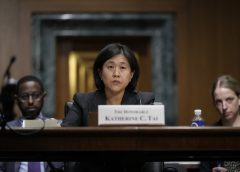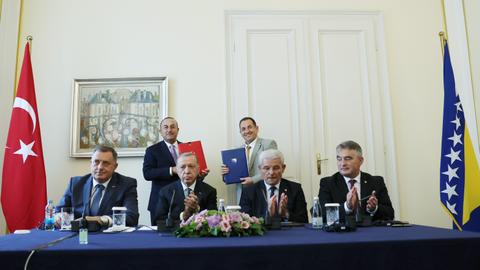
What USTR’s Tariff Ruling Means for Fashion and Textiles – Sourcing Journal
[ad_1]
Are Trump tariffs going anywhere? Not so fast, according to the nation’s top trade agency.
The Office of the United States Trade Representative (USTR) confirmed on Friday that representatives of domestic industries benefiting from the tariff actions in the Section 301 investigation of “China’s Acts, Policies and Practices Related to Technology Transfer, Intellectual Property and Innovation” want to keep the punitive duties in place.
USTR said accordingly, as required by statute, the tariffs did not expire on their four-year anniversary dates and the office will proceed with the next steps as provided in the statute. Details on the next steps in the four-year review process will be outlined in subsequent notices.
In May, USTR commenced the statutory four-year process by notifying representatives of domestic industries benefitting from the tariff actions that the duties might expire and giving them the opportunity to support their continuation. Since requests for continuation were received, the tariff actions have not terminated and USTR will conduct a review of the tariff actions.
One of those representatives of domestic industries–the National Council of Textile Organizations (NCTO)–explained its stance before a U.S. International Trade Commission (USITC) hearing in July that Section 301 penalty tariffs on finished Chinese textile and apparel imports give American manufacturers a chance to compete and provide trade officials with an essential trade negotiation tool.
Removing them, NCTO said, would reward China, put U.S. manufacturers at a competitive disadvantage and do nothing to reduce inflation. Those were among the key points outlined by NCTO president and CEO Kim Glas in written testimony submitted to the USITC during three days of hearings on the economic impact of Section 301 China tariffs and Section 232 steel tariffs on U.S. industries.
Countering that argument was the U.S. Fashion Industry Association (USIA), which said it was joining other retail and fashion industry groups to speak out about “the pernicious impact of the Section 301 tariffs on both the American fashion industry and American consumers.”
NCTO argued that the 301 penalty tariffs should remain in place “absent substantive improvements in China’s pervasive, predatory trade practices,” Glas said in her testimony. China’s illegal actions “have put U.S. companies at a serious disadvantage and tariffs give American manufacturers a chance to compete.”
Glas noted that U.S. trade officials have stressed that the penalty tariffs also create leverage and are a “significant tool” in ongoing negotiations with China. While some advocates for lifting the tariffs point to concerns about inflation, “canceling these penalty duties would do little to ease Americans’ inflationary pains,” Glas said.
U.S. companies have paid more than $150 billion in Trump tariffs on China-made goods since the Section 301 duties first went into effect four years ago, according to trade statistics from U.S. Customs and Border Protection. Trade groups such as the American Apparel & Footwear Association have said the tariffs add to inflation and result in a tax on consumers.
The tariffs were one of the few policies President Biden continued from the Trump administration after he took office. Biden said he wanted to use them as “leverage” against China in negotiations over bilateral trade.
[ad_2]
Source link


